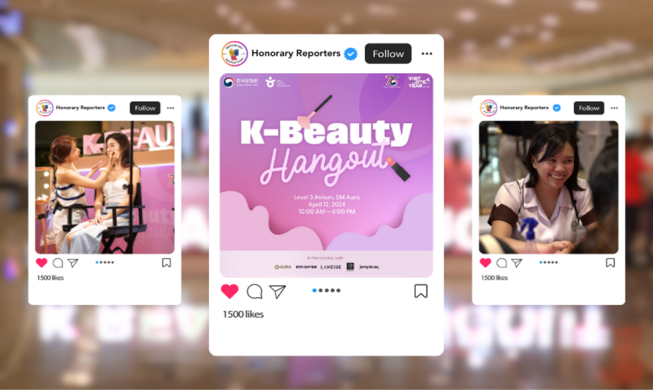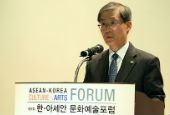-
 Korea.net's 24-hour YouTube channel
Korea.net's 24-hour YouTube channel- NEWS FOCUS
- ABOUT KOREA
- EVENTS
- RESOURCES
- GOVERNMENT
- ABOUT US
An opening ceremony to mark the beginning of a project to promote cultural exchanges between Korea, China and Japan was launched in Gwangju on March 18.
The Culture City of East Asia celebration was held at the Gwangju Culture and Art Center to kickoff the three-way cultural exchange program. The ceremony featured dance troupes from Quanzhou, in Fujian Province, China, as well as puppet shows and contemporary dance. The puppet performance is a traditional art included on UNESCO's list of intangible cultural heritage items. Denpagumi, a Japanese teenage pop group formed in 2008, sang some of their hit songs. The “Gwangju: East Asian light of culture” media event was shown, combining Gwangju’s past, present and future, and then dancers came to the stage dancing for harmony and coexistence. Finally, a choir sang, wishing for hope and prosperity across all of East Asia.
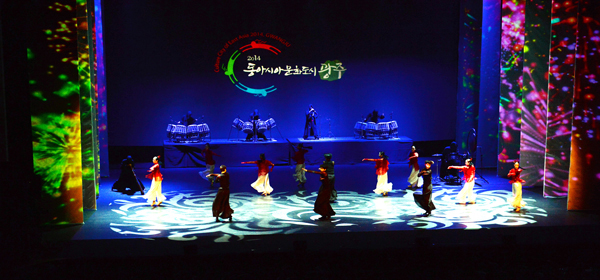
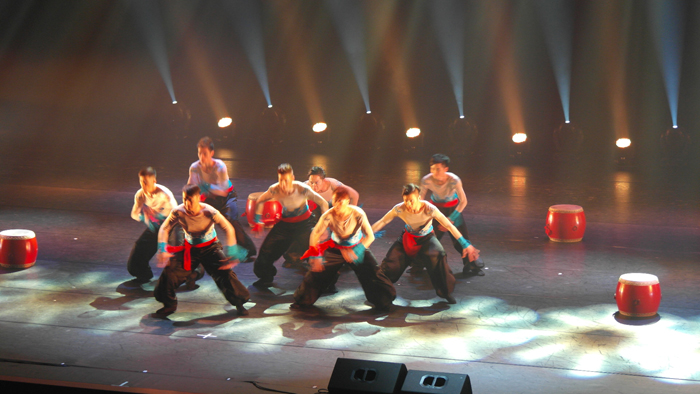
After the opening ceremony, there will be a series of events throughout the year, including cultural exchanges amongst young people of the three nations, the World Music Festival and the Gwangju Biennale.
The Culture City of East Asia project started when culture ministers of the three nations decided to expand cultural exchanges at the fourth ministers’ meeting in 2012. The goal of the program is to help people understand each other’s culture and to promote cultural exchanges and harmony. The cities of Gwangju, Quanzhou and Yokohama, in Japan, were selected as bases for cultural exchange. In a joint agreement announced in Gwangju in 2012, they decided to cooperate in the protection of cultural assets, to promote cultural content industries, to strengthen the exchange of culture and art and to educate future generations.
Quanzhou and Yokohama held their own opening ceremonies on March 13 and 25, respectively, to mark the beginning of cultural events and exchanges amongst the three nations.
“Gwangju, Quanzhou and Yokohama will cooperate in exchanging and developing cultural content, culture and art, urban renewal, specialized industry and media,” said Chung Dong-chea, chairman of the Culture City of East Asia organizing committee. “We will increase our cooperation efforts for the Yokohama Triennale and the Gwangju Biennale and promote exchanges between the Yokohama Museum of Art and the Gwangju Museum of Art. We will also broadcast each other’s documentaries.”
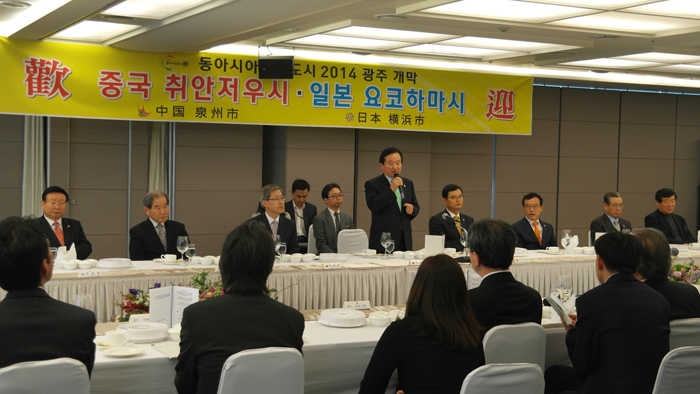
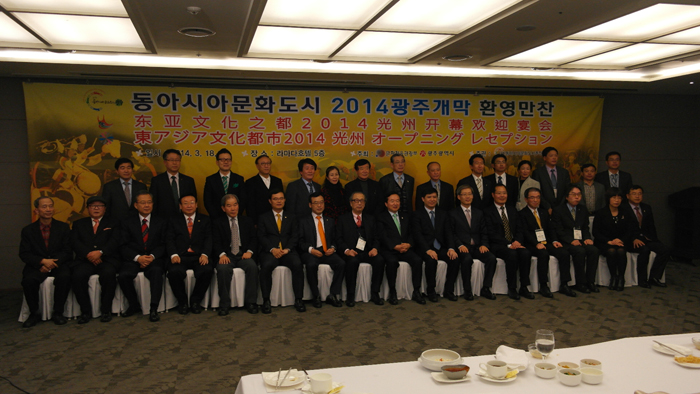
“The three cities need to have cultural exchanges on a regular basis. Thus, we need to form a joint council to have meaningful exchanges,” said Li Jinhui, deputy mayor of Quanzhou. “I was impressed with the dynamism of Gwangju. The Culture City of East Asia project will not only promote cultural exchanges, but will also have economic effects. I hope that it will be a chance to develop Asian values.”
“It is important to have cultural projects, but it is also important to think about what we can do for each other,” said Yatanabe Katsuori, deputy mayor of Yokohama. “We will actively consider the formation of a joint council, which Gwangju suggested.”
Gwangju intends to establish a joint council for the Culture City of East Asia project this year. It will consist of 15 people from both the private and public sectors and will be run as a permanent body. Later, it will be reestablished with a permanent office in the Asian Culture Complex, which will be opened next year. The three cities will also cooperate on cultural exchanges in film, animation, games, design and video.
By Limb Jae-un
Korea.net Staff Writer
jun2@korea.kr

The Culture City of East Asia celebration was held at the Gwangju Culture and Art Center to kickoff the three-way cultural exchange program. The ceremony featured dance troupes from Quanzhou, in Fujian Province, China, as well as puppet shows and contemporary dance. The puppet performance is a traditional art included on UNESCO's list of intangible cultural heritage items. Denpagumi, a Japanese teenage pop group formed in 2008, sang some of their hit songs. The “Gwangju: East Asian light of culture” media event was shown, combining Gwangju’s past, present and future, and then dancers came to the stage dancing for harmony and coexistence. Finally, a choir sang, wishing for hope and prosperity across all of East Asia.


The Culture City of East Asia celebration has performers from Korea, China and Japan. It was held at the Gwangju Culture and Art Center on March 18. (photos courtesy of the Ministry of Culture, Sports and Tourism)
After the opening ceremony, there will be a series of events throughout the year, including cultural exchanges amongst young people of the three nations, the World Music Festival and the Gwangju Biennale.
The Culture City of East Asia project started when culture ministers of the three nations decided to expand cultural exchanges at the fourth ministers’ meeting in 2012. The goal of the program is to help people understand each other’s culture and to promote cultural exchanges and harmony. The cities of Gwangju, Quanzhou and Yokohama, in Japan, were selected as bases for cultural exchange. In a joint agreement announced in Gwangju in 2012, they decided to cooperate in the protection of cultural assets, to promote cultural content industries, to strengthen the exchange of culture and art and to educate future generations.
Quanzhou and Yokohama held their own opening ceremonies on March 13 and 25, respectively, to mark the beginning of cultural events and exchanges amongst the three nations.
“Gwangju, Quanzhou and Yokohama will cooperate in exchanging and developing cultural content, culture and art, urban renewal, specialized industry and media,” said Chung Dong-chea, chairman of the Culture City of East Asia organizing committee. “We will increase our cooperation efforts for the Yokohama Triennale and the Gwangju Biennale and promote exchanges between the Yokohama Museum of Art and the Gwangju Museum of Art. We will also broadcast each other’s documentaries.”


Representatives from Korea, China and Japan participate in a press conference and welcome dinner before the opening ceremony for the Culture City of East Asia project in Gwangju. (photos courtesy of the Ministry of Culture, Sports and Tourism)
“The three cities need to have cultural exchanges on a regular basis. Thus, we need to form a joint council to have meaningful exchanges,” said Li Jinhui, deputy mayor of Quanzhou. “I was impressed with the dynamism of Gwangju. The Culture City of East Asia project will not only promote cultural exchanges, but will also have economic effects. I hope that it will be a chance to develop Asian values.”
“It is important to have cultural projects, but it is also important to think about what we can do for each other,” said Yatanabe Katsuori, deputy mayor of Yokohama. “We will actively consider the formation of a joint council, which Gwangju suggested.”
Gwangju intends to establish a joint council for the Culture City of East Asia project this year. It will consist of 15 people from both the private and public sectors and will be run as a permanent body. Later, it will be reestablished with a permanent office in the Asian Culture Complex, which will be opened next year. The three cities will also cooperate on cultural exchanges in film, animation, games, design and video.
By Limb Jae-un
Korea.net Staff Writer
jun2@korea.kr
Related Contents
Most popular
- First hearing-impaired K-pop act hopes for 'barrier-free world'
- Event 'K-Beauty Hang Out' draws hundreds in Philippines
- 'Mad Max' director impressed by 'cinema-literate' Korean viewers
- Ceremony in Seoul inducts 2,641 content creators of Korean culture
- Romanian presidential couple visits national cemetery




